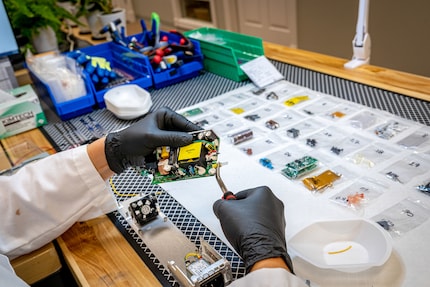
Background information
Repairing instead of throwing away: what the EU’s Right to Repair provides
by Jan Johannsen

Consumers in the EU will have a right to repairs in the future, meaning they’ll be entitled to fixing their devices and won’t have to replace them at their own expense. TÜV Rheinland (German Association for Technical Inspection) is being offered a new service by manufacturers whereby they’ll check whether their products can be restored.
The right to repair is on its way. A new EU law will give customers the right to have broken goods repaired – both within and beyond the legal guarantee for products, as has been decided by the European Parliament and the Council.
This means that anyone who discovers a defect after the warranty period has expired can, in future, demand that the seller rectify it. Alongside this, the EU member states have agreed on the new Ecodesign for Sustainable Products Regulation. This means manufacturers are required to make many consumer products fundamentally repairable. These innovations affect items that can technically be returned to their original condition, explains René Repasi, the President of the Council and the European Parliament’s chief negotiator. That includes household devices, like washing machines, and everyday items like mobile phones.
A new service at TÜV Rheinland has now been launched so that companies and manufacturers can indicate how well their product range can be restored to working order. It offers manufacturers the opportunity to outline a repairs list for the products in their possession.
When I asked how manufacturers benefit from this, Stephan Scheuer, Head of Business Development and Product Sustainability at TÜV Rheinland, replied: «This gives manufacturers a quick, independent, technical statement on where they stand with the repairability of their product design. This enables them to adapt to new demands quickly, optimise their products and improve their repairability where necessary. Inexperienced manufacturers can draw on the resources and expertise of TÜV and also advertise with a verified statement on renewability.
Companies already seem to be taking advantage of this. According to sustainability experts, companies are actively contacting the technical service provider TÜV Rheinland and asking for their support. As a result of this, the idea to have an index for repairs came about. TÜV is in contact with the manufacturers and with the regulatory bodies that have voted on the ‘right to repair’: «Our goal is to establish direct contact between the regulators, the European Parliament, and industry as a neutral body. And to promote dialogue for a better understanding for everyone involved – with a high level of transparency,» Scheuer tells me.
Although the ‘right to repair’ only applies to the EU, the service offered is also of interest to non-EU countries such as Switzerland. After all, these are often based on the regulations of EU countries in order to avoid trade barriers or a stagnation in the flow of goods. The analysis of repairability is therefore country-independent and offered globally by TÜV to all manufacturers.
There’s no limits for having repairability as criteria for sustainable design in the circular economy.
TÜV Rheinland employees analyse a variety of factors to determine the index, such as product documentation or parts that are important for the product to get it working again. The object is also disassembled in the process to check whether and how the goods in question can be restored to their original condition.

In addition to basic repairability, the following reforms have been included in the policy:
This should make it easier and cheaper to replace goods than to buy new ones. According to a nationwide Ipsos survey conducted in mid-2023, 79 per cent of the 1,000 respondents think the ‘right to repair’ makes sense. It’s estimated that consumers lose twelve billion euros (article in German) every year because they don’t know where and for what price they can use a repair service, disposing of the item instead of having it replaced. According to calculations, this produces 35 million tons of waste per year.
We can no longer afford to live in a throwaway society.
The law will help consumers make more sustainable consumption decisions in the future. Less waste will be produced and resources will be conserved. In technical terms, this is referred to as «Strengthening the circular economy».
This change would benefit the climate and environmental targets from the European Green Deal, a set of measures with a series of political initiatives to be more environmentally friendly. The overarching goal is for Europe to be the first climate neutral continent by 2050.
If you’d like to find out more, you can find a good summary of the Green Deal in the following video (in German):
The European Parliament and Council still have to formally adopt the proposal. It will then be published in the Official Journal of the European Union. 20 days after its publication, the ‘right to repair’ will then automatically come into force.
Cat lady and coffee lover from up north. Always on the lookout for «News and Trends».
Interesting facts about products, behind-the-scenes looks at manufacturers and deep-dives on interesting people.
Show all